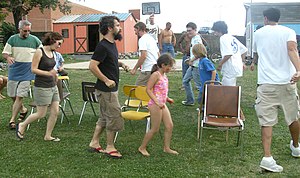Musical chairs
Musical chairs is a game of elimination involving players, chairs, and music, with one fewer chair than players. When the music stops whichever player fails to sit on a chair is eliminated, with a chair then being removed and the process repeated until only one player remains.
 Musical chairs being played at a party | |
| Players | Variable |
|---|---|
| Setup time | Variable |
| Playing time | Variable |
| Random chance | Music stoppage may seem random to players, but is under the control of the leader |
| Age range | Usually children |
| Skill(s) required | Quick reaction time |
It is also a metaphor for pointless shuffling of personnel in an organization; a fruitless, repeated scavenger hunt-like experience; and cyclic replacement of political leaders, as in multiple cabinet shuffles.
In Wales, musical chairs had a similar custom to the modern version, with slight differences; the boys would always sit whilst the girls would skip around, always outnumbering the boys, if the a girl didn't sit fast enough on the boy's lap, she would have to forfeit, this would continue until the end when the winning girl would kiss the last boy on the cheek.[1]
As metaphor
The term "playing musical chairs" is also a metaphor for describing any activity where items or people are repeatedly and usually pointlessly shuffled among various locations or positions. It can also refer to a condition where people have to expend time searching for a resource, such as having to travel from one gasoline station to another when there is a shortage. It may also refer to political situations where one leader replaces another, only to be rapidly replaced due to the instability of the governing system (see cabinet shuffle).
In the musical Evita, during the song "The Art of the Possible", Juan Perón and a group of other military officers play a game of musical chairs which Perón wins, symbolizing his rise to power.
See also
References
| Wikimedia Commons has media related to Musical chairs. |